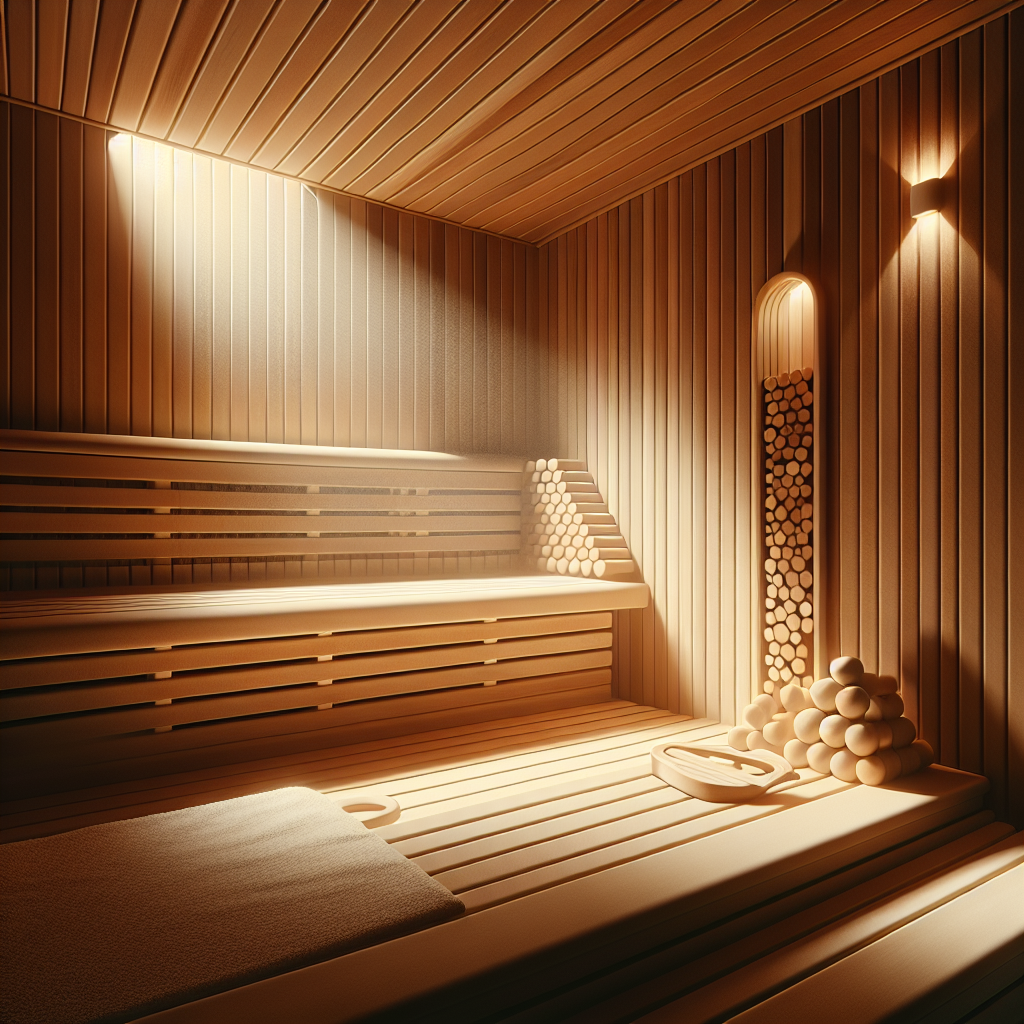Imagine stepping into a tranquil oasis where stress and anxiety melt away, leaving you feeling rejuvenated and at peace. That’s the tantalizing promise of saunas, but can they really deliver? In this article, we will explore the potential benefits of saunas in helping alleviate stress and anxiety. By understanding the science behind saunas and how they affect our bodies, you’ll discover whether these soothing retreats could be the key to finding serenity in a fast-paced world. So sit back, relax, and let’s explore the calming power of saunas together!
What are saunas?
Definition of a sauna
A sauna is a small room or space designed to generate heat, typically using hot rocks or steam. It is a traditional Finnish practice that has been adopted and adapted in different cultures around the world. Saunas are known for their use in relaxation and purification rituals, as well as for their potential health benefits.
Different types of saunas
There are several different types of saunas, each offering a unique experience. The most common types include:
-
Traditional Saunas: These saunas use dry heat and are typically heated by a wood-burning stove or electric heater. The temperature in traditional saunas can range from 170 to 200 degrees Fahrenheit.
-
Infrared Saunas: Infrared saunas use infrared heaters to emit radiant heat, which is directly absorbed by the body. These saunas operate at a lower temperature (typically between 120 and 150 degrees Fahrenheit) and are often preferred by individuals who find high temperatures uncomfortable.
-
Steam Rooms: Steam rooms, also called wet saunas, generate wet heat by producing steam using a combination of hot water and a steam generator. The high humidity in steam rooms can provide a different sauna experience compared to traditional or infrared saunas.
-
Mobile Saunas: Mobile saunas are portable units that can be easily transported and set up in different locations. They are often used for outdoor events or gatherings.
-
Sauna Pods: Sauna pods are small personal saunas designed to accommodate one person comfortably. These compact and portable units provide an individualized sauna experience.
Understanding the different types of saunas allows you to choose the one that best suits your preferences and needs.
Understanding stress and anxiety
Definition of stress
Stress is a natural response to demands or pressure experienced in our daily lives. It can be triggered by various factors, including work, relationships, finances, or health issues. When stress levels become overwhelming, they can lead to physical, mental, and emotional symptoms that affect overall well-being.
Causes of stress
Stress can stem from a variety of sources, such as work-related pressure, personal or family issues, financial concerns, or major life events. Each individual may experience stress differently, and the causes vary greatly depending on personal circumstances. Regardless of the cause, chronic or excessive stress can have a significant impact on overall health and quality of life.
Definition of anxiety
Anxiety is a persistent feeling of worry, fear, or unease that is typically disproportionate to the actual threat or situation. It is a normal human emotion, but excessive or irrational anxiety can be debilitating and interfere with daily activities and relationships.
Causes of anxiety
Anxiety can be triggered by a variety of factors, including genetics, brain chemistry, traumatic experiences, or ongoing stress. Anxiety disorders can manifest in different ways, such as generalized anxiety disorder (GAD), panic disorder, social anxiety disorder, or specific phobias. Identifying the causes of anxiety is crucial in determining appropriate treatment and management strategies.

How saunas work
Principle of heat therapy
Saunas work on the principle of heat therapy, which involves exposing the body to high temperatures for a set period of time. This heat exposure induces physiological changes within the body, leading to various health benefits. Heat therapy has been practiced for centuries and is known for its ability to promote relaxation, relieve muscle tension, and enhance circulation.
Effects of sauna on the body
Saunas have several effects on the body, including:
-
Increased circulation: The heat from saunas causes blood vessels to dilate, resulting in improved blood flow throughout the body. This increased circulation can benefit the cardiovascular system and help deliver oxygen and nutrients to various organs and tissues.
-
Sweating and detoxification: Saunas trigger sweating, which helps remove toxins and impurities from the body. Through sweating, saunas can aid in detoxification and enhance the functioning of the skin.
-
Muscle relaxation: The heat from saunas can help relax and soothe muscles, reducing tension and promoting a sense of physical and mental relaxation.
-
Improved respiratory function: The warm, steamy environment of certain saunas, such as steam rooms, can help open up airways and improve respiratory function. This can be especially beneficial for individuals with respiratory conditions such as asthma or allergies.
Understanding how saunas work on a physiological level provides insight into the potential benefits they may offer for stress relief and anxiety reduction.
The relation between saunas and stress relief
Saunas as a relaxation tool
Saunas have long been recognized as a relaxation tool, providing a peaceful and calming environment in which individuals can unwind and de-stress. The combination of the warm temperature, quiet ambiance, and release of endorphins (feel-good hormones) contributes to the overall relaxation experience.
Reduction of stress hormones
Research suggests that saunas may help reduce stress hormones such as cortisol. The heat exposure from saunas activates the body’s natural stress response and triggers the release of endorphins, which can counteract the effects of stress hormones. The relaxation induced by saunas can contribute to a reduction in overall stress levels and promote a sense of well-being.
Promotion of restful sleep
Stress can often disrupt sleep patterns, leading to poor sleep quality and further exacerbating stress levels. Saunas can help promote restful sleep by relaxing the body and mind before bedtime. The body’s natural cooling process post-sauna can also trigger drowsiness, making it easier to fall asleep and maintain a deep sleep throughout the night.

The relation between saunas and anxiety reduction
Saunas as a calming environment
The tranquil environment of saunas can provide a sense of calmness and tranquility, making them an ideal space for individuals experiencing anxiety. The combination of heat, relaxation, and sensory deprivation can help quiet the mind, reduce racing thoughts, and create a meditative-like state.
Stimulation of endorphin release
Endorphins are the body’s natural pain-relieving and mood-boosting chemicals. Sauna use stimulates the release of endorphins, which can help alleviate symptoms of anxiety and create a sense of euphoria or well-being. The natural high induced by endorphins promotes relaxation and can counteract feelings of anxiety.
Indirect impact on anxiety triggers
Engaging in regular sauna sessions can have an indirect impact on anxiety triggers. By dedicating time to self-care and relaxation, individuals can develop coping mechanisms and strategies to manage anxiety. The consistent practice of stress reduction techniques, such as sauna use, can contribute to overall resilience and a decreased vulnerability to anxiety triggers.
Potential risks and considerations
Heat-related risks
While saunas offer numerous benefits, it is essential to be aware of potential risks and take necessary precautions. Prolonged exposure to high temperatures can lead to dehydration, heatstroke, or overheating. It is important to drink plenty of water before, during, and after sauna sessions to maintain proper hydration levels. Additionally, individuals with certain medical conditions, such as cardiovascular problems or low blood pressure, should consult with a healthcare professional before using saunas.
Individual health conditions
It is vital to consider individual health conditions and consult with a healthcare professional before using saunas. Certain conditions, such as pregnancy, respiratory disorders, skin conditions, or acute health issues, may require specific guidelines or restrictions for sauna use. Understanding personal health limitations will help ensure safe and effective sauna sessions.
Duration and frequency recommendations
The duration and frequency of sauna sessions depend on individual comfort levels and tolerance to heat. It is generally recommended to start with shorter sessions, usually 10 to 15 minutes, and gradually increase the duration as tolerated. Regular sauna use, 2 to 3 times per week, is often suggested for optimal benefits. However, moderation is key, and individuals should listen to their bodies to prevent overheating or exhaustion.
Hydration and sauna use
Proper hydration is crucial when using saunas. The high temperatures and sweating can lead to significant fluid loss, so it is important to drink water before, during, and after sauna sessions. Hydrating adequately helps prevent dehydration, maintain proper body temperature regulation, and support the body’s natural detoxification processes.
Supporting research studies
Scientific studies on sauna use for stress reduction
Numerous scientific studies have explored the effects of sauna use on stress reduction. For example, a study published in the Journal of Psychosomatic Research found that regular sauna bathing was associated with reduced levels of perceived stress and improved emotional well-being among young adults. Another study published in the International Journal of Environmental Research and Public Health found that sauna bathing led to significant reductions in stress scores among individuals with chronic tension-type headaches.
Scientific studies on sauna use for anxiety reduction
While research specifically focused on sauna use for anxiety reduction is limited, studies on the effects of heat therapy and relaxation techniques offer valuable insights. For instance, a study published in the Journal of Alternative and Complementary Medicine found that heat therapy, including sauna use, was effective in reducing symptoms of anxiety and depression among individuals with fibromyalgia. Another study published in the Journal of Clinical Psychology showed that relaxation techniques, such as those experienced in saunas, were effective in reducing anxiety levels among college students.
Other stress and anxiety management techniques
Therapeutic exercises
Engaging in therapeutic exercises, such as yoga, tai chi, or Pilates, can help reduce stress and anxiety levels. These exercises promote relaxation, deep breathing, and mindfulness, which can enhance overall well-being and emotional stability.
Meditation and mindfulness
Practicing meditation and mindfulness techniques can provide significant benefits for stress and anxiety management. Taking time each day to focus on breath awareness, present moment experiences, or guided meditation can help calm the mind, reduce stress, and enhance self-awareness.
Cognitive-behavioral therapy
Cognitive-behavioral therapy (CBT) is a therapeutic approach that helps individuals identify and modify negative thought patterns and behaviors. This evidence-based treatment is effective in managing stress and anxiety by teaching individuals coping skills, relaxation techniques, and problem-solving strategies.
Healthy lifestyle choices
Maintaining a healthy lifestyle can play a crucial role in managing stress and anxiety. Adequate sleep, regular physical activity, a balanced diet, and a supportive social network all contribute to overall well-being and resilience to stress. Taking steps to prioritize personal wellness can have a positive impact on both mental and physical health.
Personal experiences and testimonials
Individual stories on sauna use for stress
Many individuals have shared their positive experiences with sauna use for stress relief. Some have reported feeling a sense of calmness, improved relaxation, and reduced muscle tension after regular sauna sessions. They often highlight the importance of creating a dedicated self-care routine that includes sauna use to manage stress effectively.
Individual stories on sauna use for anxiety
While personal stories specifically focused on sauna use for anxiety are less common, individuals who have struggled with anxiety have shared how saunas have served as a sanctuary for relaxation and self-reflection. They have expressed feeling a greater sense of calm and reduced anxiety symptoms after regular sauna use.
Conclusion
Saunas can indeed play a role in stress and anxiety relief. Through heat therapy, saunas promote relaxation, reduce stress hormones, and stimulate the release of endorphins. The calming environment and physical benefits of saunas can contribute to overall well-being and serve as a valuable tool for stress and anxiety management.
However, it is essential to consider individual health conditions, practice moderation, and stay properly hydrated when using saunas. Additionally, saunas are most effective when used in combination with other stress and anxiety management techniques, such as therapeutic exercises, mindfulness practices, or therapy.
Overall, saunas can be a valuable addition to a holistic approach for stress and anxiety reduction. With proper guidance, precaution, and self-awareness, individuals can harness the potential benefits of saunas to support their mental well-being and lead a more balanced and fulfilling life.

